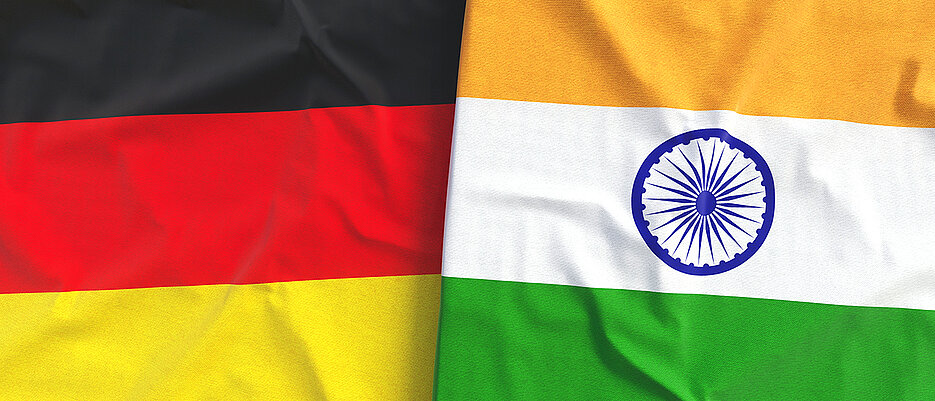Two New Collaborations with India
09/09/2025Getting Indo-German research projects off the ground: This is the aim of a joint programme of the Indian Ministry of Education and the German Federal Foreign Office. The University of Würzburg is represented with two projects.

There is no doubt that India, the world's most populous country, is on its way to becoming a major economic and political power. Before 2030, it will probably be the third largest economic power in the world. For years, the country has been undergoing a dynamic transformation process that encompasses the economy, politics, society and, in particular, the higher education and science system - as the German Academic Exchange Service DAAD writes in a recent perspective paper.
Accordingly, India is also becoming an increasingly important strategic partner for German universities, which is reflected in the growing number of Indo-German cooperation programmes. One of these is the SPARC-GIANT programme, an initiative jointly funded by the Indian Ministry of Education and the German Federal Foreign Office. SPARC in this case stands for Scheme for Promotion Academic Research & Collaboration. The programme is run jointly by the DAAD and the Indian Institute of Technology Kharagpur (IIT KGP).
A Double Master's Degree with Nanosystems
In the current round of this programme, twelve Indo-German research projects have now been approved - selected from 85 applications from Germany and 92 from India. Two of them are based at the Julius-Maximilians-Universität Würzburg (JMU).
Functional nanosystems are at the centre of one of the projects. JMU is cooperating with the Indian Institute of Science Education and Research Thiruvananthapuram (IISER TVM). The two institutions are planning to set up a double master's degree programme that combines the scientific strengths of both institutions. JMU will contribute its expertise in the fields of supramolecular chemistry, nanomaterials and light-matter interaction from the Faculties of Physics and Chemistry and combine this with IISER TVM's internationally recognised research in the natural sciences.
The project aims to tackle global challenges with a particular focus on functional nanosystems, sustainability and climate-related research. To this end, the participating institutions want to develop hybrid study modules, promote student mobility, hold joint workshops and lay the foundations for a future double degree Master's programme.
Interested physics and chemistry students can apply for a GIANT internship at IISER-TVM at any time. Further information : www.uni-wuerzburg.de/giant
New Therapies against Tuberculosis
New therapies for the treatment of mycobacterial infections, such as tuberculosis, are at the centre of the second project. Cooperation partners in this case are the Indian Institute of Technology (IIT) Indore and the Faculty of Medicine at JMU, represented by the Chair of Anatomy and Cell Biology II, where Professor Srikanth Karnati is responsible. The participating institutions are planning a joint international training programme that will bring together young biomedical researchers with experienced scientists from India and Germany.
As part of exchange programmes and joint laboratory internships, the participants will gain insights into the latest medical techniques; at conferences and seminars, they will deal with ethical issues relating to research. And science communication will also be part of their training. A workshop in the field of advanced electron microscopy is expected to take place in mid-October 2025 at the Institute of Anatomy and Cell Biology at JMU Würzburg. Ten doctoral students from IIT Indore are expected to attend.
India Moves more into Focus at JMU
The University of Würzburg has increasingly focussed on India in recent years. The most recent example of this is the founding of the India Competence Centre of the University of Würzburg (ICCUW) a few weeks ago. The new competence centre serves as a central point of contact for all JMU activities relating to India. One of its main tasks is to promote interdisciplinary exchange in science as well as economic, cultural and political relations between German and Indian research partners.
Doris Fischer, Vice President of the University of Würzburg with a focus on "Internationalisation", is therefore very pleased about JMU's successful performance in the SPARC-GIANT programme. "The two new collaborations will make an important contribution to promoting cooperation between JMU and its partner institutions in India," says Fischer. According to her, this will not only benefit the young scientists involved, who will be able to gain valuable insights beyond their own horizons. Society as a whole will also benefit - thanks to new findings from research and the associated innovations in medicine and technology.






